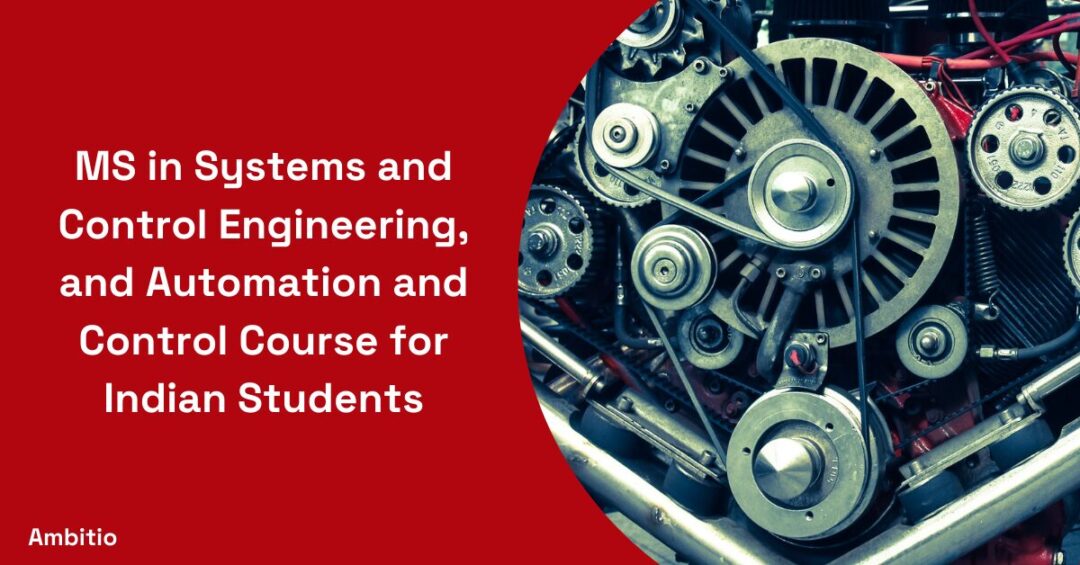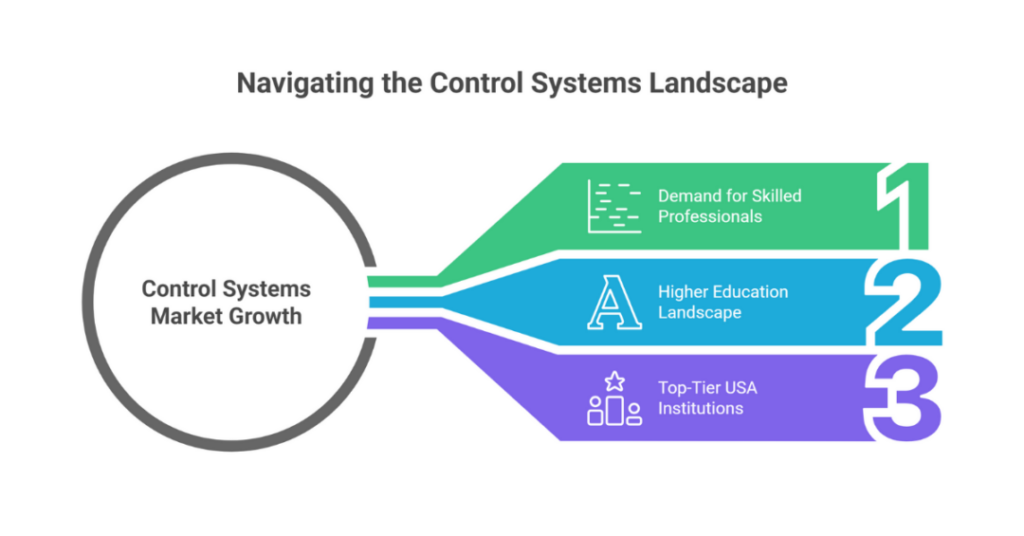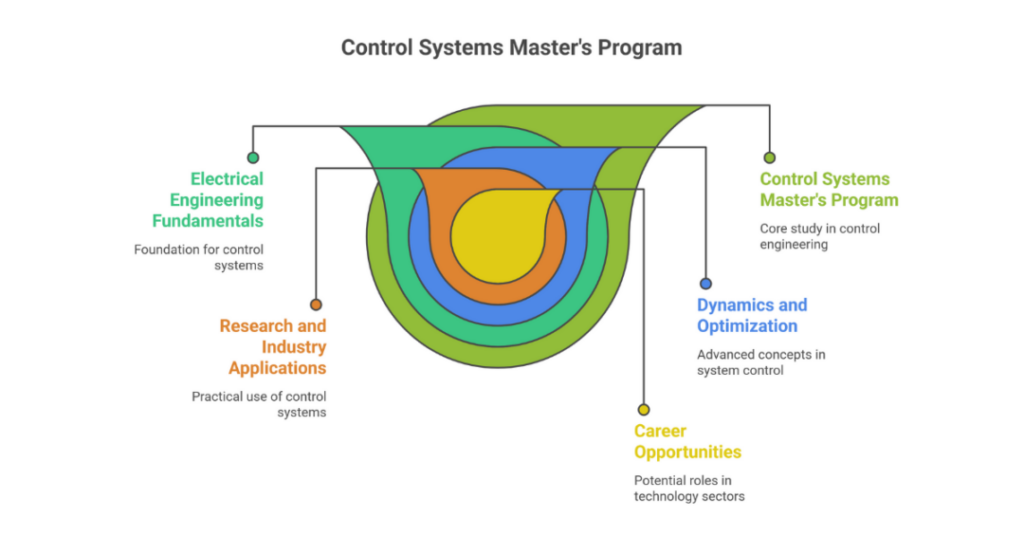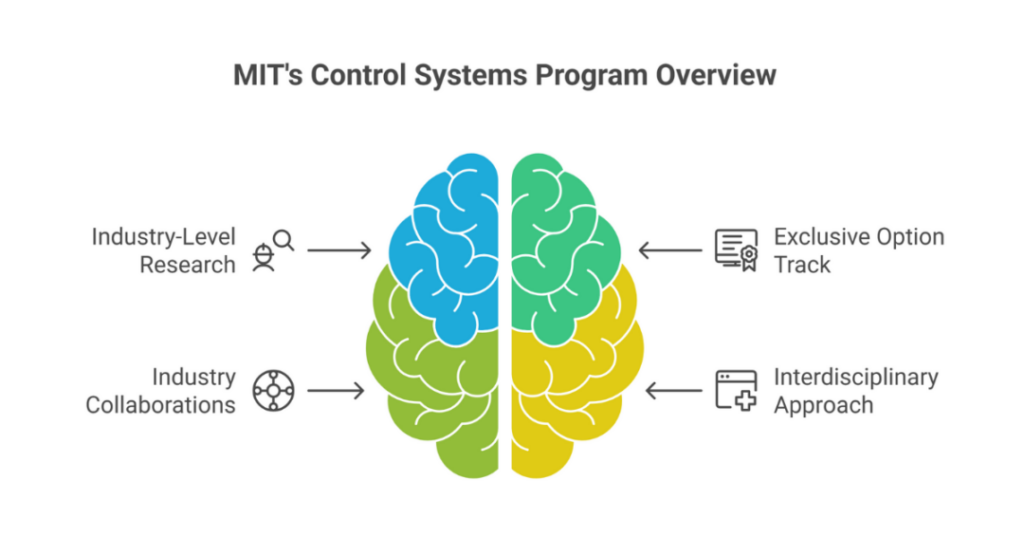3 September 2025
9 minutes read
Masters in Control Systems in USA: MS in Systems and Control Engineering, and Automation and Control Course for Indian Students

Key Takeaways
- Masters in control systems in USA builds expertise in automation, robotics, and advanced engineering for global career opportunities.
- Masters in control systems in USA offers research exposure at top universities with cutting-edge industrial applications.
- Masters in control systems in USA leads to high-paying roles in aerospace, automotive, and manufacturing industries.
Did you know, globally, the control systems market is predicted to exceed $166.3 Billion by 2028? The growth of the market shows a critical need for skilled professionals in the industry. As more industries and processes evolve with other advancements, the need for professionals who can conceptualize, design, implement, integrate and maintain underlying control systems is growing.
For many of those wanting to pursue an engineering degree, the landscape of higher education in control systems can be overwhelming. With so many universities that offer a program in control systems, it is difficult to narrow your choice to determine which would best defend your goals and research interests.
However, if you only consider top-tier USA institutions, known for leading research and industry engagement in control-engineering, you place yourself in the right jurisdiction for an interesting or evolving future in the rapidly developing field of control-engineering.
What is Masters in Control Systems in USA?
A Masters in Control Systems in the USA is a master’s program that offers advanced study of the theory of field of control-engineering. It is designed to advance-careers in companies involved with aero, robotics, and manufacturing, for example.

These programs typically integrate the fundamentals of electrical-engineering with elements of dynamics and optimization. You’ll collaborate with knowledgeable faculty to develop models for complex systems and identify new approaches for the control of dynamic systems.
Whether you’re focusing on becoming a research engineer or wish to lead automation in an industry setting, this degree will help you acquire the skills you need in order to excel in an evolving technology space.
You can use a GPA calculator for MS in USA to have an accurate idea of what chance you stand. There are many affordable masters degree in USA for international students to choose from as well.
Types of Graduate Programs in Control Systems Engineering
The graduate programs in Control Systems-Engineering located in the USA can offer different varieties depending on the attractiveness and background of the student. Understand whether you need an SAT to study in USA as well.
Master of Control Engineering (MCE) Programs
The Master of Control-Engineering programs focus on advanced control systems, like nonlinear control and automation. Programs typically will require a proficiency in mathematics and provide specialized courses.
Master of Science (MS) in Control Systems Engineering Programs
The Master of Science programs provide a broader perspective on control-engineering. They cover but are not limited to modern control systems theory, image processing, and artificial intelligence. These programs typically mix research and practical applications and may require a thesis.
Graduate Certificate in Control Systems Engineering Programs
The Graduate Certificate programs are for those people looking for shorter commitment programs to learn specialized knowledge about control systems. It is also a possible program if you are a professional looking for upskilling or specialization.
Top Universities in USA for MS in Modern Control and Nonlinear Control Systems
Applicants need to understand the difference between private and public universities in the USA before making a choice.

Here is a list of some of the best Universities in USA for MS in Control Systems that you would like to choose from:
1. Massachusetts Institute of Technology (MIT)
MIT‘s in control systems is known for its industry-level research in adaptive control systems and robotics. The Department of Mechanical Engineering has an exclusive option track in control systems with students working on projects with with industry stalwarts like Boeing and NASA.
The advantage of MIT is its interdisciplinary approach that allows students to explore many applications in autonomous vehicles to bioengineering.
2. Stanford University
Stanford’s Electrical Engineering department is among the best in the world for nonlinear control systems. The strength of their program is the flexibility for students to take courses more in line with their particular interests.
Consequently, Stanford is near many technology companies, which offer internship opportunities as well as industry-sponsored projects as real-world experiences in control systems applications of their choice of tech startup i.e. Analog Devices or an established company i.e. Cisco Systems.
3. University of California, Berkeley
UC Berkeley‘s program has an emphasis on robust control theory and applications of control theory in renewable energy systems. The Control, Intelligent Systems, and Robotics group in the EECS department has world-class cadre of faculty that lead the field in networked control systems.
In addition, the students benefit from Berkeley’s ties to national labs and often participate in some of the most innovative research taking place at these institutions.
4. Georgia Institute of Technology
Georgia Tech‘s program excels in the area of cyber-physical systems and control. The School of Electrical and Computer Engineering has a unique combination of solid theoretical basis and practical implementation. Georgia Tech also has a cooperative education program. Students can alternate semesters of study to full-time employment, gaining industry experience.
5. University of Michigan, Ann Arbor
Michigan‘s program has a strong emphasis on automotive control systems, taking advantage of the strength of the automotive industry in geographic proximity to the university. The Robotics Institute also offers interdisciplinary courses (e.g., combining control theory, machine learning, and artificial intelligence, which are critical components for the future of autonomous systems).
6. California Institute of Technology (Caltech)
Caltech‘s small program size makes it easy to work with faculty on topics like distributed control and optimization. The Control and Dynamical Systems option in EE is well regarded for its mathematical rigor. Caltech is a great place for someone interested in a future research-career since many of its grads go on to top PhD programs.
7. Carnegie Mellon University
CMU‘s program is distinctive in terms of incorporating control systems with artificial intelligence and machine learning. Control-related courses offered in the Robotics Institute are innovative and allow students the opportunity to study decision making under uncertainty, and reinforcement learning for control.

Students in CMU’s program have the ability to work on real-world problems with industry partners in many domains, such as autonomous driving, robotic grasping/manipulation, and smart manufacturing.
8. University of Illinois Urbana-Champaign
The UIUC program is particularly strong in the area of networked control and application to IoT (Internet of Things) environments.
The Coordinated Science Laboratory at the university benefits from a multidisciplinary array of researchers, which allows students to engage in complex control science challenges. UIUC is one of the few programs that specializes in control of quantum systems, providing students with a foundation in an upcoming growing area of research.
9. Purdue University
Purdue‘s program is very strong in rigorous and adaptive control with applications in aerospace-systems. The School of Aeronautics and Astronautics has unique classes (not offered elsewhere) in spacecraft attitude dynamics and control. The university has long partnerships with many in the aviation industry and students are able to tackle substantial real-world aerospace-control problems.
10. University of Texas at Austin
The focus of UT Austin‘s program is typically large-scale systems and optimization. The Department of Aerospace Engineering and Engineering Mechanics offers a promising set of classes in Autonomous Robot Control and Swarm Robotics courses.
In addition, UT Austin has the added opportunity to work related to the Army Futures Command which produces unique opportunities for students from the standpoint of impact on defense-related control system projects.
Admission Criteria for MS in Control Systems in the USA
While universities in the USA have differing admission criteria for MS in Control Systems applicants, the basic requirements do not differ that much across institutions. Most universities are looking for candidates with some sort of prior engineering background, but usually in electrical-engineering or mechanical engineering.
Usually you’ll require a bachelor’s degree in a related field, an acceptable GPA (generally 3.0 or higher), and GRE-scores. In addition, many programs also require experience with simulation software and experience analyzing complex systems.
Some schools may have additional admissions requirements because of the specifics of their area of specialization (i.e., automotive control systems). Make sure to check each school’s website for specifics in the application procedure.
Don’t forget to include any relevant experiences or projects in the application procedure or resume; these could be a nice asset to differentiate yourself from other candidates. Also, understand the cost of studying in USA for Indian students.
Curriculum and Coursework in Control Systems Engineering Programs
The curriculum within Control Systems-Engineering programs is designed to provide a blend of theory and applied material. Most programs will start with core courses in linear systems, signal-processing, and optimization-methods.
As you continue within the program, you will study specialized topics such as nonlinear control, adaptive systems, and robotics. Many programs will offer electives that cross-disciplinary boundaries or provide specialized areas of study, such as renewable energy systems or autonomous vehicles.
You will likely be assessed on projects that reflect “real world” control problems; this type of “working” scholarship can be rewarding! Some universities work with the industry to offer internship or co-op experiences. The goal is to prepare you for the complexities of contemporary control systems, whether your future plans lead you in a research or application oriented direction.
Scholarships and Financial Aid for International Students
Studying for a Master’s in Control Systems in the USA can be costly, but there are many options for financial aid and scholarships to help international students meet the costs.
| Scholarship Name | Description | Eligibility Criteria |
|---|---|---|
| Fulbright Foreign Student Program | Offers grants for international students to study in the USA. | Varies by country and program. |
| Joint Japan/World Bank Graduate Scholarship Program | Arms students from World Bank member countries with full scholarships. | You must be a national of a World Bank member country. |
| American Association of University Women (AAUW) International Fellowships | Supports women studying for graduate-degrees in the USA. | Female international students. |
| Rotary Foundation Global Grants | Grants offered to students to supplement graduate-level studies or research. | Available to Rotary club/district-sponsored students. |
| EducationUSA Scholarships | Multiple scholarships and other financial aid programs to support international students. | Depends on the scholarship. |
Career Prospects After Completing a Master’s in Control Systems
Getting a Master of Science in Control-Engineering can provide a wealth of different career paths in many fields. Grads are often in high-demand roles that development in technology and automated systems in the world around us continue to grow more complex.
You could work in aerospace, developing control systems for aircraft and satellites. The automotive industry always needs control-engineers to help develop autonomous vehicles or some form of a smart vehicle.That same skill set is needed in robotics, manufacturing, and even renewable energy, all places that hire recent undergraduate students.
Many grads will join major technology companies, while others will join start-ups or pursue some kind of research or advisor roles. The skills that you will have are highly transferable and allows you to switch between fields as your personal interests change.
| Industry | Job Titles | Responsibilities | Average Salary (Approx.) |
|---|---|---|---|
| Aerospace | Control Systems Engineer, Flight Systems Engineer | Design and maintain control systems for aircraft and spacecraft, ensuring safety and performance. | $90,000 – $130,000 |
| Automotive | Automation Engineer, Automotive Control Engineer | Improve vehicle performance, and implement automated systems for safety and efficiency. | $80,000 – $120,000 |
| Manufacturing | Process Control Engineer, Manufacturing Systems Engineer | Optimize manufacturing processes, increase efficiency, and reduce production costs. | $75,000 – $110,000 |
| Energy | Energy Control Systems Engineer, Renewable Energy Engineer | Monitor and control energy production and distribution systems, and develop sustainable energy solutions. | $80,000 – $120,000 |
| Healthcare | Medical Device Control Engineer, Healthcare Systems Engineer | Design and maintain control systems for medical equipment, ensuring patient safety and precision. | $85,000 – $125,000 |
| Robotics | Robotics Engineer, Automation Specialist | Develop and program robots for various applications, and improve automation in industries. | $85,000 – $130,000 |
| Research & Academia | Control Systems Researcher, Professor | Conduct cutting-edge research, educate future engineers, and contribute to advancements in the field. | Varies |
Conclusion
When selecting a Control Systems program it is not only the rankings of the programs, but it is finding your niche. Every university will offer a different experience, whether that is emerging research or strong industry partnerships. So think about what captures your imagination in this field. Is it robotics? Renewable energy? Automotive systems?
Your choice today could shape your job satisfaction for life. Skills in control-engineering are in demand in many industries, so don’t worry too much about that. Just find the area that you will really enjoy studying. Your passion will be your best asset in this anywhere but the ordinary field.
Choose Ambitio for an exceptional USA education! Join a global family, immerse in hands-on learning, and learn from the brightest minds. Elevate your education with us – Study in USA.
Dive into the success stories of students who’ve secured spots in some of the most prestigious institutions in the USA. Get inspired, compare profiles, and discover what it takes to join the ranks of these top admits.
FAQs
What is masters in control systems in USA?
Masters in control systems in USA is a graduate program focusing on automation, robotics, and dynamic systems. Students pursuing masters in control systems in USA gain specialized technical expertise. A masters in control systems in USA also prepares graduates for global engineering careers.
Which universities offer masters in control systems in USA?
Top universities like MIT, Stanford, and Michigan offer masters in control systems in USA with advanced research opportunities. Masters in control systems in USA programs at these schools are globally recognized. Choosing the right masters in control systems in USA ensures academic and career success.
What are the admission requirements for masters in control systems in USA?
Admission to masters in control systems in USA generally requires transcripts, GPA, GRE scores, and TOEFL or IELTS. Applicants for masters in control systems in USA must also submit a personal statement and letters of recommendation. Preparing thoroughly increases chances for masters in control systems in USA acceptance.
How much does it cost to pursue masters in control systems in USA?
The tuition fees for masters in control systems in USA range from $25,000 to $55,000 annually. Living expenses for masters in control systems in USA can add another $10,000 to $20,000. Scholarships and aid help reduce the total cost of studying masters in control systems in USA.
What career options follow after masters in control systems in USA?
Graduates with masters in control systems in USA work in robotics, aerospace, and automotive industries. A masters in control systems in USA also opens roles in manufacturing and signal processing. Many graduates of masters in control systems in USA secure high-paying positions worldwide.
Is GRE required for masters in control systems in USA?
Most universities require GRE for masters in control systems in USA, though some may waive it. Submitting GRE scores strengthens applications for masters in control systems in USA. For competitive programs, GRE is often expected in masters in control systems in USA admissions.
Can international students apply for masters in control systems in USA?
Yes, international students can apply for masters in control systems in USA at top universities. Masters in control systems in USA programs welcome diverse applicants worldwide. Scholarships for international students make pursuing masters in control systems in USA more affordable.

You can study at top universities worldwide!
Get expert tips and tricks to get into top universities with a free expert session.
Book Your Free 30-Minute Session Now! Book a call now




























